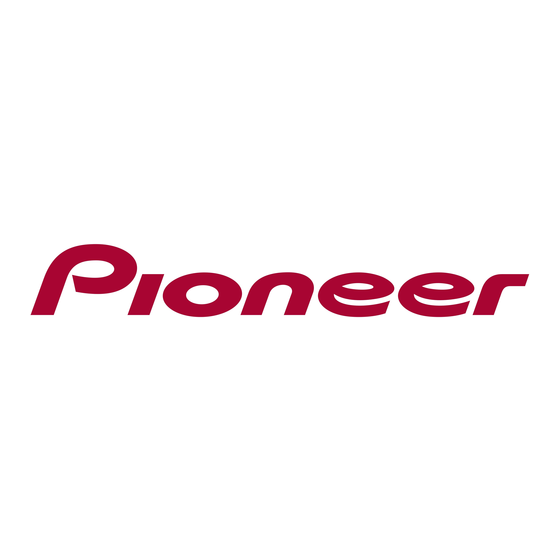Pioneer PDR-509 Manual de Instruções - Página 4
Procurar online ou descarregar pdf Manual de Instruções para Leitor de CD Pioneer PDR-509. Pioneer PDR-509 40 páginas. Compact disc recorder
Também para Pioneer PDR-509: Esquemas de serviço (23 páginas), Manual de serviço (48 páginas), Manual de serviço (23 páginas), Manual de serviço (14 páginas)

This product complies with the Low Voltage Directive (73/23/EEC), EMC Directives (89/336/EEC, 92/31/EEC) and CE Marking
Directive (93/68/EEC).
INFRINGEMENT OF COPYRIGHT [For U.K. model]
Recording and playback of copyrighted material may require consent. See the Copyright Design and Patent Act 1988.
[For U.K. model]
CAUTION
This product contains a laser diode of higher class
than 1. To ensure continued safety, do not remove any
covers or attempt to gain access to the inside of the
product.
Refer all servicing to qualified personnel.
The following caution label appears on your unit.
Before You Start
Features of the PDR-509 CD Recorder
4
Create your own audio CDs
At last, there's a convenient and affordable way to make your own audio
original recordings, or put together compilations of favorite tracks from your existing
might also want to put your vinyl collection on to
ity, convenience and durability of
recordings from radio or satellite broadcasts, and making personal copies of
leave in the car, keeping the originals safe at home.
Make digital recordings from any source
The PDR-509 can accept digital input via optical or coaxial cable, meaning that you can connect
it to almost any other digital audio component. Also, thanks to the built in sampling rate con-
verter, you can make direct digital recordings from satellite (usually 32kHz),
48kHz), as well as
and
CD
MD
44.1kHz sources only) enables you to record
Analog sources are also provided for with the analog line inputs, suitable for connection to
standard audio components such as cassette decks and turntables. High-quality analog-to-digital
conversion, paired with
's excellent dynamic range and broad frequency capabilities, results in
CD
recordings that are virtually indistinguishable from the original.
Use both ordinary recordable CDs and rewritable CDs
Ordinary recordable
s (
–
CD
CD
R
blank discs and the ability to play the recorded discs on any ordinary
for many applications. Compact Disc Rewritable, or
that allows erasing and re-recording of the disc. Although the blank discs are more expensive,
CD
this ability to use the discs over and over gives them the edge in terms of flexibility over
** Before
–
s can be played on ordinary
CD
R
contents of the disc so that no further recording is possible). While most
problems with
–
discs, if the laser pickup is dirty (from prolonged exposure to tobacco smoke, for
CD
R
example), the player may not be able to read some
** At the time of writing, most ordinary
came with the player for compatibility.
Location: Rear of the unit.
CLASS 1
LASER PRODUCT
to take advantage of the superior portabil-
CD
s over vinyl records. Other uses include making high-quality
CD
(both 44.1kHz). A sampling rate converter 'through' feature (for
and
HDCD
DTS
) can be recorded on just once, but the relatively cheap cost of
–
, is a more recent type of recordable
CD
RW
players, they must be 'finalized' (a process that fixes the
CD
–
discs.
CD
R
players cannot play
CD
CD
s. Create your own
CD
s. You
CD
s,
s, etc. to
CD
MD
and
DCC
DAT
encoded
s, too.
CD
player* make them ideal
CD
–
CD
players should have no
CD
–
discs. Check in the instructions that
RW
(up to
**.
R
